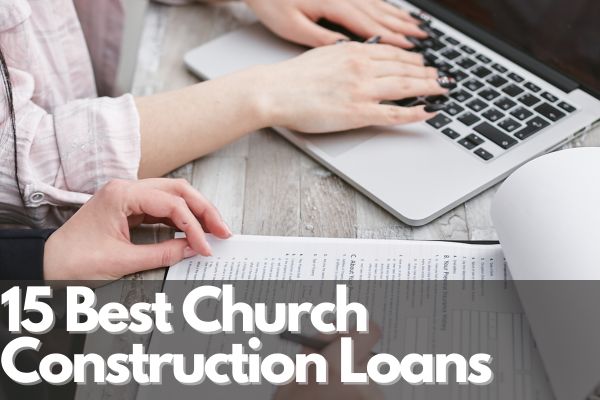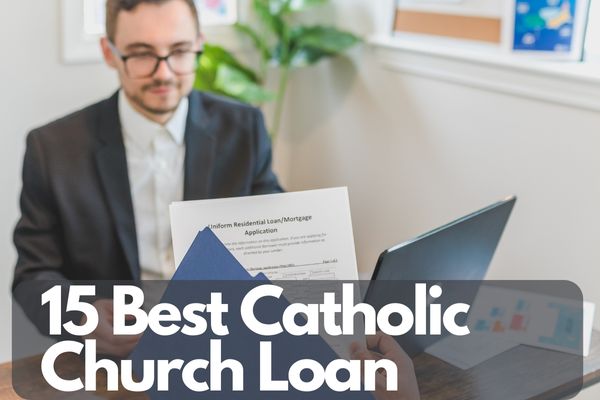When it comes to constructing a church, financing can be a significant obstacle to overcome. Fortunately, there are many options available to churches seeking construction loans.
From government-backed loans to private equity, nonprofit financing, and even crowdfunding, there are numerous avenues for churches to obtain the financing they need to build a new worship space or expand an existing one.
In this article, we’ll outline the 15 best church construction loans available to help churches navigate the complex world of financing and find the best option for their specific needs.
Whether you’re a small congregation or a large denomination, there’s a financing solution out there that can help you achieve your construction goals.
15 Best Church Construction Loans
1. SBA 7(a) Loan
This loan is a government-backed loan that can help churches finance construction projects. It offers a low interest rate, longer repayment terms, and a low down payment, making it an attractive option for many churches.
2. Church Bond
A church bond is a type of debt security issued by a church to raise funds for a construction project. These bonds offer a fixed interest rate and typically have a set maturity date, making them a predictable source of financing.
3. Traditional Bank Loan
A traditional bank loan is a standard loan that churches can obtain from banks or other financial institutions. It typically requires a good credit history and a significant down payment.
4. USDA Rural Development Loan
This loan is designed to help rural communities, including churches, obtain financing for construction projects. It offers low-interest rates and flexible repayment terms.
5. Nonprofit Financing
There are many nonprofit organizations that offer financing to churches and other nonprofits. These loans often have more flexible terms and lower interest rates than traditional bank loans.
6. Community Development Financial Institution (CDFI) Loan
A CDFI loan is a type of loan offered by nonprofit organizations that serve underserved communities. These loans can offer lower interest rates and more flexible terms than traditional bank loans.
7. Private Equity
Private equity firms can provide financing to churches for construction projects. However, they typically require a significant equity stake in the project and may have higher interest rates than other loan options.
8. Crowdfunding
Crowdfunding platforms allow churches to raise funds for their construction projects from a large number of individuals. This can be a great way to raise money quickly and efficiently.
9. Church Extension Fund
Many denominations have their own church extension funds that provide financing to churches for construction projects. These funds often offer lower interest rates and more flexible terms than traditional lenders.
10. Equipment Leasing
Equipment leasing companies can help churches obtain financing for equipment needed for their construction projects. This can include everything from construction equipment to audio-visual equipment.
11. State-Sponsored Loan Programs
Many states offer loan programs to help churches and other nonprofits obtain financing for construction projects. These loans may have lower interest rates and more flexible terms than traditional bank loans.
12. Small Business Investment Companies (SBICs)
SBICs are investment firms that provide financing to small businesses, including churches. They typically require an equity stake in the project.
13. Tax-Exempt Bond Financing
This is a type of financing that is available to nonprofit organizations, including churches. These bonds have lower interest rates than traditional loans and are tax-exempt.
14. Church Building Funds
Many churches have their own building funds that members contribute to. These funds can be used to finance construction projects.
15. Real Estate Investment Trusts (REITs)
REITs are investment firms that own and manage income-producing properties, including churches. They can provide financing to churches for construction projects.
4 Simple Requirements For Getting Church Construction Loans
Here are four simple requirements for getting church construction loans:
1. Solid Financial Plan
Before applying for a church construction loan, you must have a solid financial plan in place. This should include a detailed budget that outlines the cost of the construction project, as well as a plan for repaying the loan.
2. Strong Credit History
This means that the church should have a history of paying its debts on time and managing its finances responsibly.
3. Collateral Or Guarantor
Depending on the lender, you may need to provide collateral or a guarantor to secure the loan. This can include property, equipment, or another asset that can be used as collateral.
4. Church Membership
Some lenders may require that the church or organization applying for the loan be a member of a particular denomination or have a certain level of involvement in the local community.
It’s important to research the requirements of potential lenders before applying for a loan.
Benefits Of A Church Construction Loan
There are several benefits to obtaining a church construction loan for a construction project:
1. Access To Capital
Church construction loans provide churches with access to the capital they need to fund their construction projects. Without this financing, many churches would be unable to afford to build or expand their facilities.
2. Flexible Terms
Many church construction loans offer flexible terms, including longer repayment periods and lower interest rates, making them more affordable for churches to repay over time.
3. Predictable Payments
Fixed-rate loans, such as church bonds or tax-exempt bond financing, offer predictable payments over the life of the loan. This can help churches better budget for their construction projects and avoid unexpected expenses.
4. Lower Interest Rates
Many church construction loans offer lower interest rates than traditional bank loans, making them more affordable for churches.
5. Support From Lenders
Many lenders that specialize in church construction loans have expertise in the unique needs and challenges facing churches. This means they can provide valuable support and guidance throughout the construction process.
6. Tailored Loan Programs
Many lenders offer tailored loan programs designed specifically for churches. These programs can provide churches with the financing they need to complete their construction projects while also meeting their specific financial goals and objectives.
7. Enhanced Community Presence
A well-built and well-equipped church can enhance the community presence of the church and attract new members. This can help churches grow and thrive in the long-term.
How To Apply For Church Construction Loan Options
The application process for a church construction loan will vary depending on the lender and the type of loan being applied for.
However, here are some general steps that churches can follow when applying for a church construction loan:
1. Determine The Loan Amount
Before applying for a loan, churches should determine how much financing they need to complete their construction project.
This will help them narrow down the types of loans they should apply for and find the best option for their specific needs.
2. Gather Financial Information
Churches should gather all necessary financial information, including financial statements, tax returns, and bank statements, to provide to the lender.
Lenders will use this information to determine the church’s creditworthiness and ability to repay the loan.
3. Research Lenders
Churches should research potential lenders to find one that specializes in church construction loans and has a good reputation in the industry.
They can also consider working with a financial advisor or consultant to help them find the best loan option for their needs.
4. Complete The Application
Once a lender has been selected, churches will need to complete an application that includes information about the church and the construction project.
The application may include questions about the church’s financial history, the estimated project costs, and the proposed repayment terms.
5. Provide Additional Documentation
After the initial application is submitted, the lender may request additional documentation, such as building plans or construction estimates, to help them evaluate the loan request.
6. Review And Approval
Once all necessary documentation has been provided, the lender will review the loan application and make a decision on whether to approve or deny the loan request.
If approved, the lender will provide the church with the loan terms and conditions, which the church will need to review and accept before the funds can be disbursed.
It’s important to note that the application process for a church construction loan can be complex and time-consuming.
Churches should plan ahead and start the application process well in advance of their construction start date to ensure they have enough time to secure financing.
Conclusion
Obtaining a church construction loan can be a great option for churches looking to fund their construction projects. With access to capital, flexible terms, and lower interest rates, churches can finance their projects while keeping their budgets in check.
Lenders specializing in church construction loans can provide valuable support and guidance throughout the process.
However, the application process can be complex, so it’s important for churches to do their research, gather all necessary financial information, and plan ahead to ensure a smooth and successful loan application.
By following these steps, churches can secure the financing they need to build or expand their facilities and enhance their community presence for years to come.







